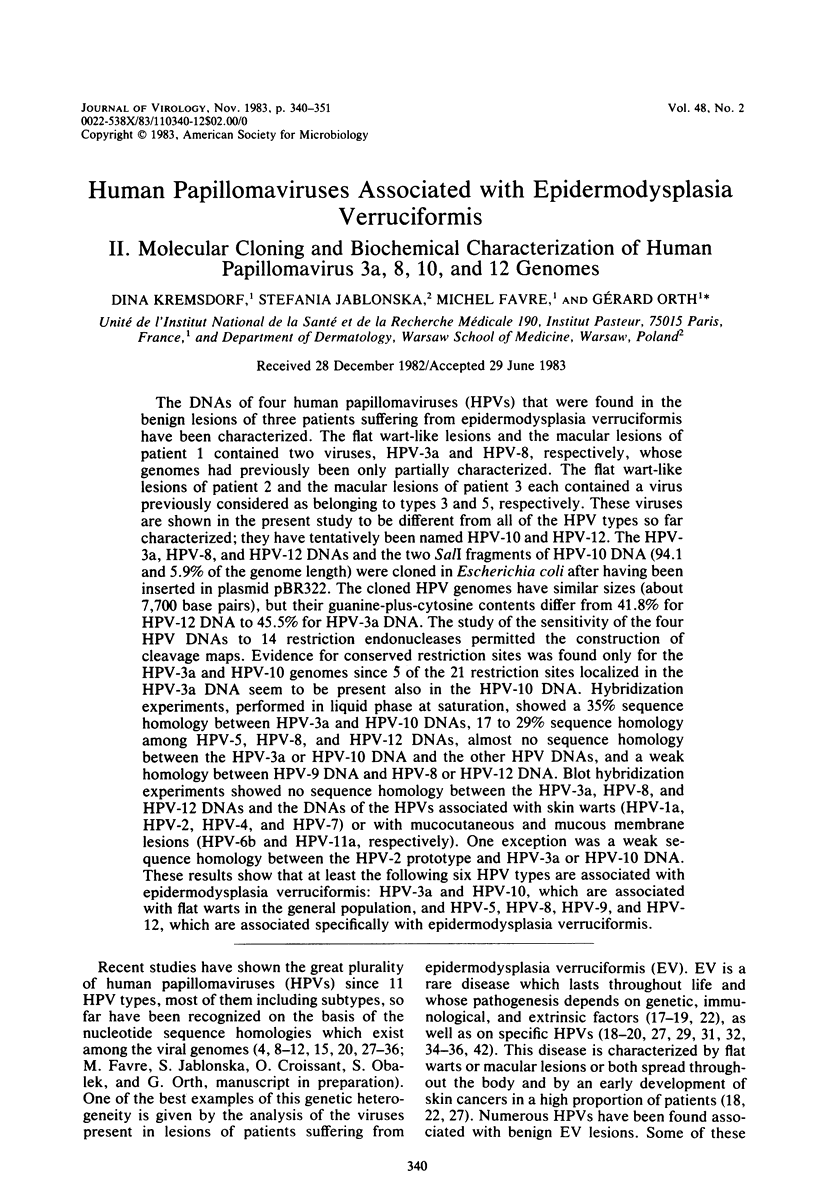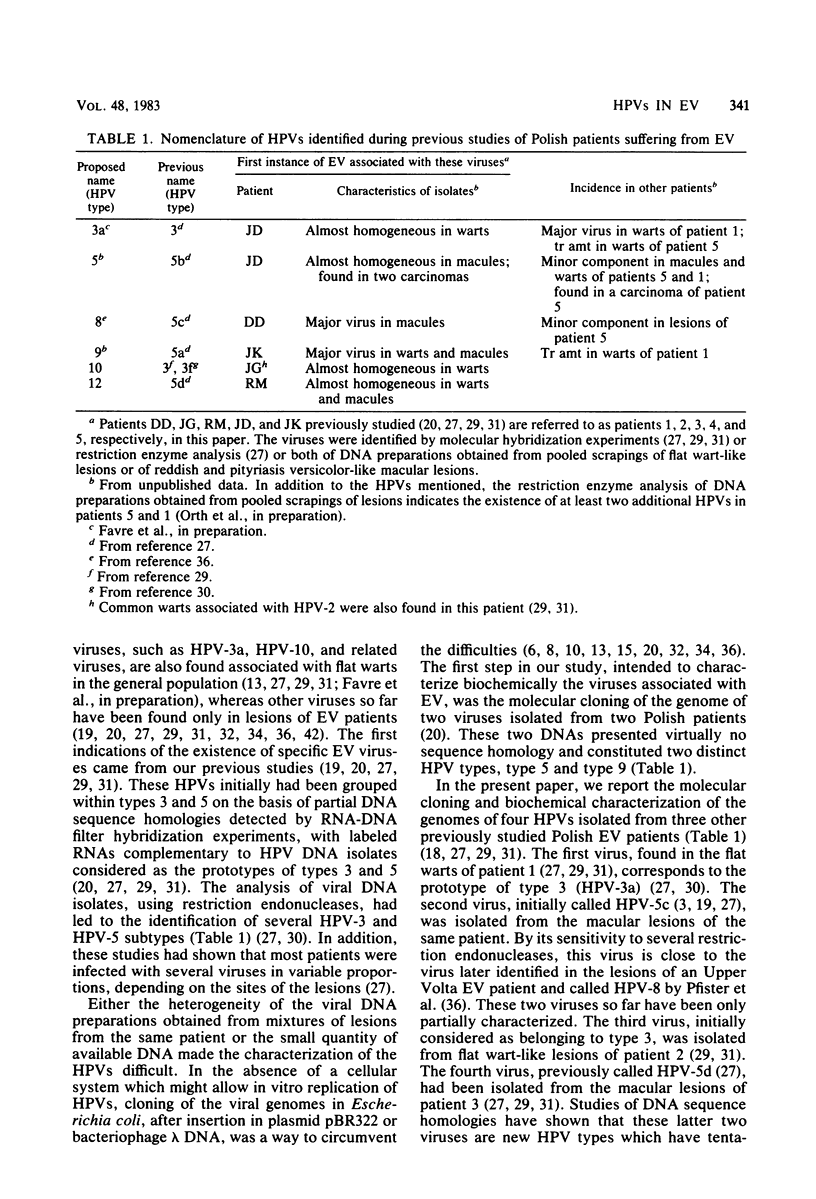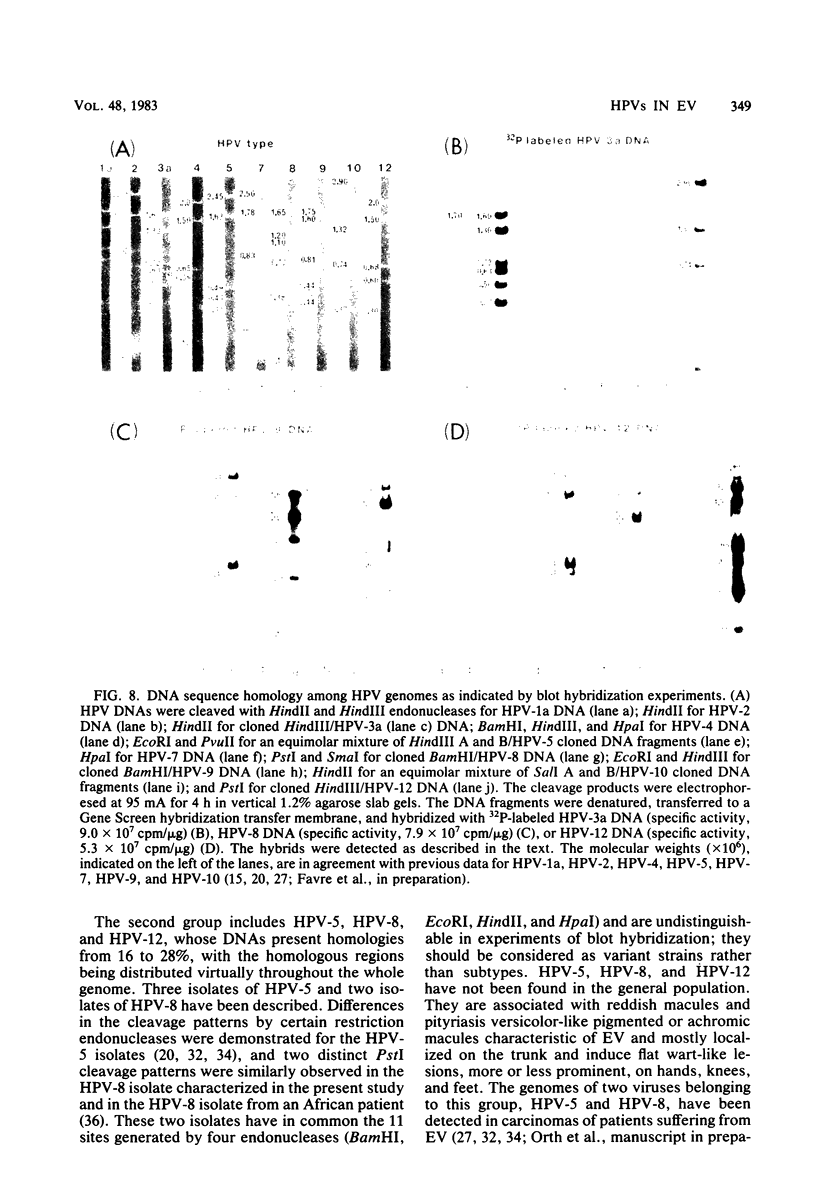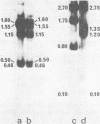Abstract
The DNAs of four human papillomaviruses (HPVs) that were found in the benign lesions of three patients suffering from epidermodysplasia verruciformis have been characterized. The flat wart-like lesions and the macular lesions of patient 1 contained two viruses, HPV-3a and HPV-8, respectively, whose genomes had previously been only partially characterized. The flat wart-like lesions of patient 2 and the macular lesions of patient 3 each contained a virus previously considered as belonging to types 3 and 5, respectively. These viruses are shown in the present study to be different from all of the HPV types so far characterized; they have tentatively been named HPV-10 and HPV-12. The HPV-3a, HPV-8, and HPV-12 DNAs and the two SalI fragments of HPV-10 DNA (94.1 and 5.9% of the genome length) were cloned in Escherichia coli after having been inserted in plasmid pBR322. The cloned HPV genomes have similar sizes (about 7,700 base pairs), but their guanine-plus-cytosine contents differ from 41.8% for HPV-12 DNA to 45.5% for HPV-3a DNA. The study of the sensitivity of the four HPV DNAs to 14 restriction endonucleases permitted the construction of cleavage maps. Evidence for conserved restriction sites was found only for the HPV-3a and HPV-10 genomes since 5 of the 21 restriction sites localized in the HPV-3a DNA seem to be present also in the HPV-10 DNA. Hybridization experiments, performed in liquid phase at saturation, showed a 35% sequence homology between HPV-3a and HPV-10 DNAs, 17 to 29% sequence homology among HPV-5, HPV-8, and HPV-12 DNAs, almost no sequence homology between the HPV-3a or HPV-10 DNA and the other HPV DNAs, and a weak homology between HPV-9 DNA and HPV-8 or HPV-12 DNA. Blot hybridization experiments showed no sequence homology between the HPV-3a, HPV-8, and HPV-12 DNAs and the DNAs of the HPVs associated with skin warts (HPV-1a, HPV-2, HPV-4, and HPV-7) or with mucocutaneous and mucous membrane lesions (HPV-6b and HPV-11a, respectively). One exception was a weak sequence homology between the HPV-2 prototype and HPV-3a or HPV-10 DNA.(ABSTRACT TRUNCATED AT 400 WORDS)
Full text
PDF











Images in this article
Selected References
These references are in PubMed. This may not be the complete list of references from this article.
- Blanchet-Bardon C., Puissant A., Lutzner M., Orth G., Nutini M. T., Guesry P. Interferon treatment of skin cancer in patients with epidermodysplasia verruciformis. Lancet. 1981 Jan 31;1(8214):274–274. doi: 10.1016/s0140-6736(81)92110-3. [DOI] [PubMed] [Google Scholar]
- Danos O., Engel L. W., Chen E. Y., Yaniv M., Howley P. M. Comparative analysis of the human type 1a and bovine type 1 papillomavirus genomes. J Virol. 1983 May;46(2):557–566. doi: 10.1128/jvi.46.2.557-566.1983. [DOI] [PMC free article] [PubMed] [Google Scholar]
- Danos O., Katinka M., Yaniv M. Human papillomavirus 1a complete DNA sequence: a novel type of genome organization among papovaviridae. EMBO J. 1982;1(2):231–236. doi: 10.1002/j.1460-2075.1982.tb01152.x. [DOI] [PMC free article] [PubMed] [Google Scholar]
- Denhardt D. T. A membrane-filter technique for the detection of complementary DNA. Biochem Biophys Res Commun. 1966 Jun 13;23(5):641–646. doi: 10.1016/0006-291x(66)90447-5. [DOI] [PubMed] [Google Scholar]
- Favre M., Orth G., Croissant O., Yaniv M. Human papillomavirus DNA: physical mapping of the cleavage sites of Bacillus amyloliquefaciens (BamI) and Haemophilus parainfluenzae (HpaII) endonucleases and evidence for partial heterogeneity. J Virol. 1977 Mar;21(3):1210–1214. doi: 10.1128/jvi.21.3.1210-1214.1977. [DOI] [PMC free article] [PubMed] [Google Scholar]
- Gissmann L., Diehl V., Schultz-Coulon H. J., zur Hausen H. Molecular cloning and characterization of human papilloma virus DNA derived from a laryngeal papilloma. J Virol. 1982 Oct;44(1):393–400. doi: 10.1128/jvi.44.1.393-400.1982. [DOI] [PMC free article] [PubMed] [Google Scholar]
- Gissmann L., Pfister H., Zur Hausen H. Human papilloma viruses (HPV): characterization of four different isolates. Virology. 1977 Feb;76(2):569–580. doi: 10.1016/0042-6822(77)90239-2. [DOI] [PubMed] [Google Scholar]
- Gissmann L., zur Hausen H. Physical characterization of deoxyribonucleic acids of different human papilloma viruses (HPV). Med Microbiol Immunol. 1978 Nov 17;166(1-4):3–11. doi: 10.1007/BF02121128. [DOI] [PubMed] [Google Scholar]
- Green M., Brackmann K. H., Sanders P. R., Loewenstein P. M., Freel J. H., Eisinger M., Switlyk S. A. Isolation of a human papillomavirus from a patient with epidermodysplasia verruciformis: presence of related viral DNA genomes in human urogenital tumors. Proc Natl Acad Sci U S A. 1982 Jul;79(14):4437–4441. doi: 10.1073/pnas.79.14.4437. [DOI] [PMC free article] [PubMed] [Google Scholar]
- Hammar H., Hammar L., Lambert L., Ringborg U. A case report including EM and DNA repair investigations in a dermatosis associated with multiple skin cancers: epidermodysplasia verruciformis. Acta Med Scand. 1976;200(6):441–446. doi: 10.1111/j.0954-6820.1976.tb08261.x. [DOI] [PubMed] [Google Scholar]
- Heilman C. A., Law M. F., Israel M. A., Howley P. M. Cloning of human papilloma virus genomic DNAs and analysis of homologous polynucleotide sequences. J Virol. 1980 Nov;36(2):395–407. doi: 10.1128/jvi.36.2.395-407.1980. [DOI] [PMC free article] [PubMed] [Google Scholar]
- Hyman R. W., Brunovskis I., Summers W. C. DNA base sequence homology between coliphages T7 and phiII and between T3 and phiII as determined by heteroduplex mapping in the electron microscope. J Mol Biol. 1973 Jun 25;77(2):189–196. doi: 10.1016/0022-2836(73)90330-6. [DOI] [PubMed] [Google Scholar]
- Jablonska S., Dabrowski J., Jakubowicz K. Epidermodysplasia verruciformis as a model in studies on the role of papovaviruses in oncogenesis. Cancer Res. 1972 Mar;32(3):583–589. [PubMed] [Google Scholar]
- Jablonska S., Orth G., Jarzabek-Chorzelska M., Rzesa G., Obałek S., Glinski W., Favre M., Croissant O. Epidermodysplasia verruciformis versus disseminated verrucae planae: is epidermodysplasia verruciformis a generalized infection with wart virus? J Invest Dermatol. 1979 Mar;72(3):114–119. doi: 10.1111/1523-1747.ep12530383. [DOI] [PubMed] [Google Scholar]
- Kienzler J. L., Laurent R., Coppey J., Favre M., Orth G., Coupez L., Agache P. Epidermodysplasie verruciforme. Données ultrastructurales, virologiques et photobiologiques; à propos d'une observation. Ann Dermatol Venereol. 1979 Jun-Jul;106(6-7):549–563. [PubMed] [Google Scholar]
- Kremsdorf D., Jablonska S., Favre M., Orth G. Biochemical characterization of two types of human papillomaviruses associated with epidermodysplasia verruciformis. J Virol. 1982 Aug;43(2):436–447. doi: 10.1128/jvi.43.2.436-447.1982. [DOI] [PMC free article] [PubMed] [Google Scholar]
- Lehmann A. R., Karran P. DNA repair. Int Rev Cytol. 1981;72:101–146. doi: 10.1016/s0074-7696(08)61195-x. [DOI] [PubMed] [Google Scholar]
- Lutzner M. A. Epidermodysplasia verruciformis. An autosomal recessive disease characterized by viral warts and skin cancer. A model for viral oncogenesis. Bull Cancer. 1978;65(2):169–182. [PubMed] [Google Scholar]
- McConaughy B. L., Laird C. D., McCarthy B. J. Nucleic acid reassociation in formamide. Biochemistry. 1969 Aug;8(8):3289–3295. doi: 10.1021/bi00836a024. [DOI] [PubMed] [Google Scholar]
- Mounts P., Shah K. V., Kashima H. Viral etiology of juvenile- and adult-onset squamous papilloma of the larynx. Proc Natl Acad Sci U S A. 1982 Sep;79(17):5425–5429. doi: 10.1073/pnas.79.17.5425. [DOI] [PMC free article] [PubMed] [Google Scholar]
- Murray K., Murray N. E. Phage lambda receptor chromosomes for DNA fragments made with restriction endonuclease III of Haemophilus influenzae and restriction endonuclease I of Escherichia coli. J Mol Biol. 1975 Nov 5;98(3):551–564. doi: 10.1016/s0022-2836(75)80086-6. [DOI] [PubMed] [Google Scholar]
- Orth G., Favre M., Croissant O. Characterization of a new type of human papillomavirus that causes skin warts. J Virol. 1977 Oct;24(1):108–120. doi: 10.1128/jvi.24.1.108-120.1977. [DOI] [PMC free article] [PubMed] [Google Scholar]
- Orth G., Jablonska S., Favre M., Croissant O., Jarzabek-Chorzelska M., Rzesa G. Characterization of two types of human papillomaviruses in lesions of epidermodysplasia verruciformis. Proc Natl Acad Sci U S A. 1978 Mar;75(3):1537–1541. doi: 10.1073/pnas.75.3.1537. [DOI] [PMC free article] [PubMed] [Google Scholar]
- Orth G., Jablonska S., Favre M., Croissant O., Obalek S., Jarzabek-Chorzelska M., Jibard N. Identification of papillomaviruses in butchers' warts. J Invest Dermatol. 1981 Feb;76(2):97–102. doi: 10.1111/1523-1747.ep12525394. [DOI] [PubMed] [Google Scholar]
- Orth G., Jablonska S., Jarzabek-Chorzelska M., Obalek S., Rzesa G., Favre M., Croissant O. Characteristics of the lesions and risk of malignant conversion associated with the type of human papillomavirus involved in epidermodysplasia verruciformis. Cancer Res. 1979 Mar;39(3):1074–1082. [PubMed] [Google Scholar]
- Ostrow R. S., Bender M., Niimura M., Seki T., Kawashima M., Pass F., Faras A. J. Human papillomavirus DNA in cutaneous primary and metastasized squamous cell carcinomas from patients with epidermodysplasia verruciformis. Proc Natl Acad Sci U S A. 1982 Mar;79(5):1634–1638. doi: 10.1073/pnas.79.5.1634. [DOI] [PMC free article] [PubMed] [Google Scholar]
- Ostrow R. S., Krzyzek R., Pass F., Faras A. J. Identification of a novel human papilloma virus in cutaneous warts of meathandlers. Virology. 1981 Jan 15;108(1):21–27. doi: 10.1016/0042-6822(81)90524-9. [DOI] [PubMed] [Google Scholar]
- Pfister H., Gassenmaier A., Nürnberger F., Stüttgen G. Human papilloma virus 5-DNA in a carcinoma of an epidermodysplasia verruciformis patient infected with various human papillomavirus types. Cancer Res. 1983 Mar;43(3):1436–1441. [PubMed] [Google Scholar]
- Pfister H., Nürnberger F., Gissmann L., zur Hausen H. Characterization of a human papillomavirus from epidermodysplasia verruciformis lesions of a patient from Upper-volta. Int J Cancer. 1981 May 15;27(5):645–650. doi: 10.1002/ijc.2910270511. [DOI] [PubMed] [Google Scholar]
- Schildkraut C. Dependence of the melting temperature of DNA on salt concentration. Biopolymers. 1965;3(2):195–208. doi: 10.1002/bip.360030207. [DOI] [PubMed] [Google Scholar]
- Southern E. M. Detection of specific sequences among DNA fragments separated by gel electrophoresis. J Mol Biol. 1975 Nov 5;98(3):503–517. doi: 10.1016/s0022-2836(75)80083-0. [DOI] [PubMed] [Google Scholar]
- Sutcliffe J. G. pBR322 restriction map derived from the DNA sequence: accurate DNA size markers up to 4361 nucleotide pairs long. Nucleic Acids Res. 1978 Aug;5(8):2721–2728. doi: 10.1093/nar/5.8.2721. [DOI] [PMC free article] [PubMed] [Google Scholar]
- Yutsudo M., Tanigaki T., Tsumori T., Watanabe S., Hakura A. New human papilloma virus isolated from epidermodysplasia verruciformis lesions. Cancer Res. 1982 Jun;42(6):2440–2443. [PubMed] [Google Scholar]
- de Villiers E. M., Gissmann L., zur Hausen H. Molecular cloning of viral DNA from human genital warts. J Virol. 1981 Dec;40(3):932–935. doi: 10.1128/jvi.40.3.932-935.1981. [DOI] [PMC free article] [PubMed] [Google Scholar]






